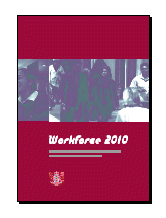
-
A Debate We Need
from The Jobs Letter No.145 / 28 May 2001
Commenting on the Workforce 2010 report, The Jobs Letter Editor VIVIAN HUTCHINSON says it has been a missed opportunity in putting the issues of "the future of work" into a national public conversation.
 WORKFORCE 2010 IS A PORTRAIT OF the trends and expectations of the
labour market in this country, as seen through the eyes of the policy advisers to the Department
of Labour. It is going to be a useful addition to the resources of people active in the
employment and training sectors.
WORKFORCE 2010 IS A PORTRAIT OF the trends and expectations of the
labour market in this country, as seen through the eyes of the policy advisers to the Department
of Labour. It is going to be a useful addition to the resources of people active in the
employment and training sectors.
But if the purpose of the report is "to inform public debate on future of the labour market", then this publication seems destined to have little immediate impact. Our Media Watch reports that, since the release of the report a month ago, no serious commentators have picked up a call for public debate on labour market issues. There has been very little political comment on the report apart from the initial Ministerial press statement ... and there have been no reviews of it in the major newspapers or comments published by academics.
This is a pity because a real public debate on current employment issues and the changing nature of work is surely overdue.
Employment Minister Steve Maharey commissioned this report as part of the Department of Labour's "future work" programme. As he says in the Foreword: "The challenges New Zealand faces in the labour market are made more complex by the fact that our economy has changed considerably in the past twenty years and will change in the future at an even faster rate. This means that the sort of jobs that will exist in the future will be very different from those that people work in currently..."
Yet this report is circumspect about the signals and trends it has researched, it avoids comment or policy recommendations on the political choices inherent in employment trends, and it seems to be written for the Labour Department and political advisers rather than the general public.
Its major conclusion on employment trends is that "the next ten years to 2010 will involve similar influences to the last ten years" ... with the current trends of globalisation, technology, demographic, social, and workplace changes continuing.
|
— Vivian Hutchinson |
Admittedly, predicting the future is a perilous business ... and the report acknowledges that there have been widely divergent forecasts in recent years about the "future of work". But it isn't good enough to simply restate the status quo. The people of New Zealand deserve much more than a definition of how things are going to remain the same, especially if we sincerely want to spark a debate on how we should cope with the sort of change, which the Minister of Employment is saying will be happening at "... an even faster rate."
This new century has not seen a widespread "end of work" as predicted by the popular authors Jeremy Rifkin and Vivianne Forrester in the 1990s. However, the predictions of a growing gap between "work rich" and "work poor" families, neighbourhoods, and communities — particularly in the regions — have certainly become a reality. And the report itself warns that there is an increasing risk that "pockets of New Zealanders" will miss out on the wealth generated in the labour market during the next decade.
Workforce 2010 avoids any frank comment on the political choices behind employment trends. For example, it observes that between 1989 and 2000, the government workforce shrank by 20%. In 1989, government, both central and local, comprised 28% of the total employment. By 2000 the government share had shrunk to 19%, a remarkably large fall of over 70,000 people in just over a decade.
It is important to recall here that very few policy advisors or economic observers in the late 1980s were predicting that such a drastic shrinkage of the government's share of employment was imminent. Yet these rapid changes did happen and were not the result of an Act of God, or because of some overseas economic trend beyond our reach. They were the consequence of the political will and the change of governance objectives by our leaders in the 1990s.
Given that political will does affect employment, we do not have to accept that the next ten years will simply default to the influences and trends of the last decade. One hopes that the governance choices of the current and emerging crop of New Zealand leaders will "raise the game" and intervene to achieve as much training and work opportunities as possible for people, and eliminate the waste of New Zealanders through unemployment.
Unfortunately, such leaders cannot look to this report for any specific policy advice on the choices required to reduce "inequalities in labour market outcomes" or to reduce the "social exclusion" that comes from unemployment. Workforce 2010 offers no prescription on what would be the best regulatory measures to take. Nor does it describe or illustrate any "best practice" interventions happening in other OECD countries that have similar employment concerns and are actively seeking and testing solutions.
The Workforce 2010 report is a good overview and backgrounder on how the Labour Department and government advisers view the labour market at this time. It is full of up-to-date statistics and charts that will prove useful to other commentators in the employment and training sectors.
But the report is a missed opportunity in putting these issues into a mainstream public conversation. It does not communicate the urgency and passion needed to encourage all New Zealanders to debate the "future of work" they want for themselves, their parents, their children, and their communities.








